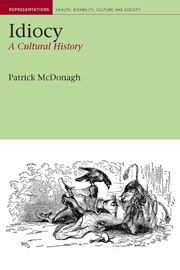Book contents
- Frontmatter
- Contents
- Preface and acknowledgements
- 1 Introduction: idiocy, culture and human relations
- 2 ‘Stripping our own hearts naked’: William Wordsworth and John Wilson read ‘The Idiot Boy’
- 3 A ‘pupil of innocent Nature!’ The wild boy of Aveyron goes to Paris
- 4 Diminished men: masculinity and idiocy
- 5 Essential women: femininity and idiocy
- 6 Holy fools, witty fools, depraved fools: folly, innocence and sin
- 7 History, society, economy: holy fools and idiots come home in nineteenth-century literature
- 8 Barnaby Rudge, idiocy and paternalism: assisting the ‘poor idiot’
- 9 Innocence, philanthropy and economics: the new ‘asylum’ idiot
- 10 Sensational idiocy
- 11 ‘The sins of the fathers’: idiocy, evolution and degeneration
- 12 Danger and degeneracy: the threat of the urban idiot
- 13 The problem of the feeble-minded: the Royal Commission, eugenics and eternal chaos
- Epilogue
- Bibliography
- Index
1 - Introduction: idiocy, culture and human relations
- Frontmatter
- Contents
- Preface and acknowledgements
- 1 Introduction: idiocy, culture and human relations
- 2 ‘Stripping our own hearts naked’: William Wordsworth and John Wilson read ‘The Idiot Boy’
- 3 A ‘pupil of innocent Nature!’ The wild boy of Aveyron goes to Paris
- 4 Diminished men: masculinity and idiocy
- 5 Essential women: femininity and idiocy
- 6 Holy fools, witty fools, depraved fools: folly, innocence and sin
- 7 History, society, economy: holy fools and idiots come home in nineteenth-century literature
- 8 Barnaby Rudge, idiocy and paternalism: assisting the ‘poor idiot’
- 9 Innocence, philanthropy and economics: the new ‘asylum’ idiot
- 10 Sensational idiocy
- 11 ‘The sins of the fathers’: idiocy, evolution and degeneration
- 12 Danger and degeneracy: the threat of the urban idiot
- 13 The problem of the feeble-minded: the Royal Commission, eugenics and eternal chaos
- Epilogue
- Bibliography
- Index
Summary
‘I have to tell you a tale’, said John Charles Bucknill to the governors of the newly formed Birmingham and Midland Counties Asylum for Idiots at their first annual meeting in 1873, at Birmingham town hall. ‘Not, I trust, as Shakespeare says, “A tale told by an idiot full of sound and fury, signifying nothing”, but, still, a tale of an idiot or of idiots. And I am warned by experience that I must trespass upon your patience so far as to describe what an idiot is’ (Bucknill 1873: 169).
We might be surprised that Bucknill, onetime medical supervisor at Devon County Asylum, the Lord Chancellor's Visitor of Lunatics and the founder of the Asylum Journal (later the Journal of Mental Science), would assume that the governors of an idiot asylum would need to have an idiot described to them, but he was, as he says, relying on experience. Let us allow him to continue:
On the occasion when it was decided by the Justices of the Peace for this County to establish the Asylum for Pauper Idiots, at Hatton, I well remember hearing an influential magistrate make the earnest inquiry – ‘Who can tell me what an idiot really is?’ I believe this question was not a vain and futile one, and that there are plenty of well-informed people who would have found it an exceedingly difficult one to answer well, and although I do know what an idiot is, I fear I shall not myself find this question an easy one to answer in this place.
(Bucknill 1873: 169–70)- Type
- Chapter
- Information
- IdiocyA Cultural History, pp. 1 - 23Publisher: Liverpool University PressPrint publication year: 2008



